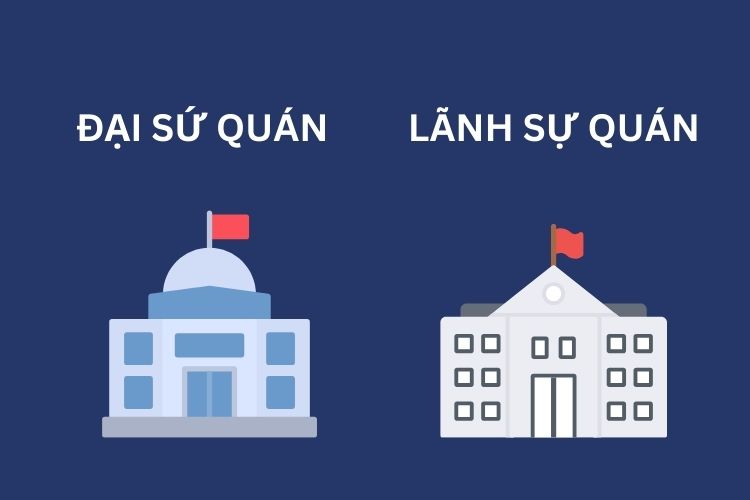Have you ever wondered how the embassy and the consulate are different? These two agencies are both representatives of a country in a foreign country, but have separate functions and powers. In this article, VN Law Firm will help you better understand the role of the Embassy, and at the same time distinguish it from the Consulate to avoid confusion.
1. What is the Embassy?
Follow Law on overseas Vietnamese representative missions 2009 (amended 2017), overseas Vietnamese representative agencies include:
- diplomatic mission (which is the embassy)
- consular agency (which is the Consulate General, Consulate)
- Representative agency at international organization
In it, Embassy is a diplomatic agency. This is the highest representative agency of the State of Vietnam in the receiving country, with the task of promoting and maintaining diplomatic relations between Vietnam and the host country.

2. Compare Embassy and Consulate
Although they are both official representative offices of a country, the Embassy and Consulate have clear differences in terms of concept, position, personnel structure and operational functions. Below is a detailed comparison table:
| Criteria | Embassy | Consulate |
|---|---|---|
| Concept | diplomatic mission of a country in another country. | consular representative office of a country, operating in a specific area of another country. |
| Position | located in the capital of the receiving country. | Located in big cities but not capitals. |
| Head position | Ambassador Extraordinary or farewell. | Consul General (for Consulate General) or Consul (for consulate). |
| Scope of activity | Working in a variety of fields: politics, military, economics, culture, etc. | Operations are narrower, mainly economically and issues related to citizens such as visas, passports, civil status. |
Note: The Embassy is fully responsible for bilateral relations, while the Consulate focuses on supporting and protecting citizens and legal entities in a specific area.
3. Duties and powers of the Vietnamese Embassy abroad
The Vietnamese Embassy abroad plays a key role in the implementation of the country’s foreign policy. Here are some important responsibilities and powers:
3.1. Promoting political, social, national defense and security relations
– Synthesize and analyze information on the political and social situation of the host country to report back to the country.
– Building and developing relations with foreign agencies and organizations to promote bilateral relations.
3.2. for the economic development of the country
– Researching foreign economic, trade and investment policies to seek cooperation opportunities.
– Provide information and support Vietnamese enterprises in trade and investment promotion.
3.3. Promoting cultural relations
– Propagating and promoting Vietnamese culture and image to international friends.
– Support cultural and artistic exchange activities between the two countries.
3.4. Performing consular duties
– Consular protection: protect the legitimate rights and interests of Vietnamese citizens and legal entities.
– Handling administrative procedures: Issuance and renewal of passports, visas (visa), handling issues related to civil status, notarization, etc.
3.5. Supporting the overseas Vietnamese community
– Disseminate policies and laws of Vietnam to the community.
– Create conditions and support Vietnamese people to stabilize their lives and integrate with the host country’s society.
– Protecting rights and preventing acts of discrimination against the Vietnamese community.


